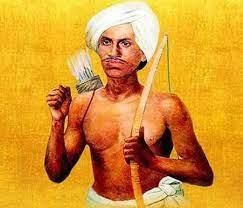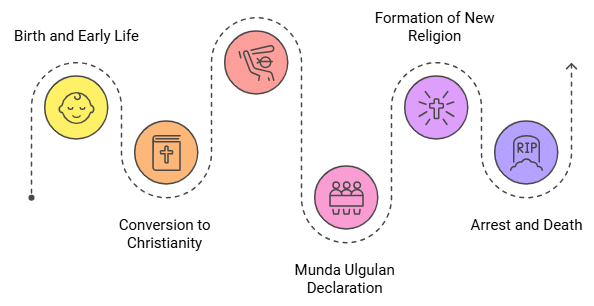Class 8 Exam > Class 8 Notes > Birsa Munda
Birsa Munda - Class 8 PDF Download

Birsa Munda
- Birsa Munda was born at Ulihatu in the Bengal Presidency (presently in Jharkhand) on 15th November 1875 into a Munda family. His parents were Sugana Munda and Karmi Hatu.
- His childhood was spent in a typical Munda fashion amidst poverty.

- He converted to Christianity and became Birsa David/Daud in order to receive an education from a missionary school.
- He spent a great part of his childhood in Chaibasa. He was influenced by the national movement there. His father withdrew him from the missionary school. Birsa developed a strong anti-government and anti-missionary stamp on his mind from there.
- During the 1890s, he started speaking to his people about the exploitation done by the British. The British agrarian policies were stifling the tribal people and disrupting their way of life which was hitherto peaceful and in tune with nature. Another problem was that of cultural belittlement of the tribal people by the Christian missionaries.
Question for Birsa MundaTry yourself: What influenced Birsa Munda to develop an anti-government and anti-missionary mindset?View Solution
- The Mundas had followed the Khunkhatti system of joint landholding. The British replaced this egalitarian system with the Zamindari System. Outsiders entered the tribal landscape and started exploiting them. In their own turf, they became forced labourers. Poverty descended on them like a strangling chain.
- In 1894, Birsa announced his declaration against the British and the Dikus (outsiders) and thus began the Munda Ulgulan. This is a very important rebellion of the tribal people among the various uprisings of the tribals and peasants in India in the 19th century.
- Birsa also started his own religion and proclaimed he was god’s messenger. Many Mundas, Kharias and Oraons accepted him as their leader. Many other Hindus and Muslims also flocked to see the new leader of the masses.
- Birsa advocated the tribal people to shun the missionaries and revert to their traditional ways. He also asked people not to pay taxes.
- He was arrested in 1895 and released after two years. In 1899, he resumed his armed struggle along with the people. He razed police stations, government property, churches and houses of Zamindars.
- The British caught him in 1900 from Jamkopai forest, Chakradharpur. Birsa Munda died on June 9th 1900 while lodged at the Ranchi jail aged just 25. Authorities claimed he died of cholera although this is doubted.
Influence of Many Schools of Thought
- Birsa went to the local missionary school, and listened to the sermons of missionaries. There too he heard it said that it was possible for the Mundas to attain the Kingdom of Heaven, and regain their lost rights.
- Later Birsa also spent some time in the company of a prominent Vaishnav preacher. He wore the sacred thread, and began to value the importance of purity and piety.
- Birsa was deeply influenced by many of the ideas he came in touch with in his growing-up years. His movement was aimed at reforming tribal society. He urged the Mundas to give up drinking liquor, clean their village, and stop believing in witchcraft and sorcery.
- In 1895 Birsa urged his followers to recover their glorious past. He talked of a golden age in the past – a satyug (the age of truth) – when Mundas lived a good life, constructed embankments, tapped natural springs, planted trees and orchards, practised cultivation to earn their living. They did not kill their brethren and relatives. They lived honestly. Birsa also wanted people to once again work on their land, settle down and cultivate their fields.
Question for Birsa MundaTry yourself: What was the objective of Birsa Munda's movement?View Solution
Reaction by British
- What worried British officials most was the political aim of the Birsa movement, for it wanted to drive out missionaries, moneylenders, Hindu landlords, and the government and set up a Munda Raj with Birsa at its head. The movement identified all these forces as the cause of the misery the Mundas were suffering.
End of Birsa Movement
- To subdue the movement Birsa was arrested in 1895 and was jailed for two years. After his release in 1897 he started to spread his ideas. People began attacking anything associated with outsiders. After the death of Birsa in 1900 the movement fizzled out.
- The importance of Birsa movement lies in the fact that it forced the British rulers to change the laws to suit the needs of tribals.
FAQs on Birsa Munda - Class 8
| 1. Who was Birsa Munda? |  |
Ans. Birsa Munda was a tribal revolutionary and freedom fighter who fought against the British colonial rule in India during the late 19th century. He was born on November 15, 1875, in Ulihatu, a village in the present-day state of Jharkhand. Birsa Munda is widely regarded as a folk hero and a symbol of the tribal resistance against the British.
| 2. What was the significance of Birsa Munda's rebellion? |  |
Ans. Birsa Munda's rebellion was significant for several reasons. First, it was one of the earliest and most significant uprisings against the British colonial rule in India. Second, it was a rebellion led by the tribal people, who were marginalized and oppressed by the British. Third, it was a rebellion that brought together several tribal communities under one banner, united in their struggle against the British.
| 3. What were the main causes of Birsa Munda's rebellion? |  |
Ans. The main causes of Birsa Munda's rebellion were the oppressive policies of the British colonial government, which had led to the displacement of tribal people from their land, loss of their traditional way of life, and exploitation by British officials and landlords. Birsa Munda's rebellion was also fueled by the religious and cultural alienation of the tribal people, who were forced to abandon their traditional beliefs and practices and adopt Christianity.
| 4. What was Birsa Munda's legacy? |  |
Ans. Birsa Munda's legacy is immense and multifaceted. He is remembered as a brave and visionary leader who fought for the rights and dignity of the tribal people. His rebellion inspired many other freedom fighters in India, and his name is revered by people across the country. Birsa Munda's legacy also includes his efforts to revive and preserve the tribal culture and traditions, which have been an important part of the Indian cultural heritage.
| 5. How is Birsa Munda remembered today? |  |
Ans. Birsa Munda is remembered today in various ways. There are several memorials and statues dedicated to him across India, and his name is celebrated in many cultural events and festivals. Birsa Munda is also remembered through his songs and stories, which have been passed down through generations of tribal people. His legacy continues to inspire people to fight for justice, freedom, and equality.
Related Searches




















